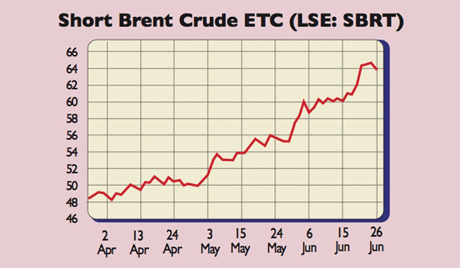
The price of Brent crude oil is down 30% since an early-March high of US$128 a barrel, reflecting broadening concerns over the world economic outlook. So if you want to bet on a continuing oil price decline, what’s the best way to do it?
Exchange-traded commodities (ETCs) have broadened access to the raw materials markets for the average retail investor. Some are designed to go up when the relevant commodities’ prices drop. But, by comparison with gold and silver ETCs, which are relatively straightforward, you need to pay particular care with tracker products in those commodities that incur significant storage costs, including energy ETCs. Depending on supply, demand and storage costs, the price of oil, wheat or copper, for example, can be quite different for future compared to immediate (or ‘spot’) delivery. This affects your return.
When commodities are in ‘contango’ (future prices exceed the spot price) there’s a constant headwind or roll cost when following a passive, index-tracking strategy. By contrast, if a commodity is in backwardation (spot prices are above future prices), you gain from rolling your position forward.
The effects can be significant: in 2009, for example, when the spot oil price rose 70%, investors in the largest oil trackers made only a single-digit return. However, if you buy an inverse (or short) ETC, which is designed to produce minus one times a commodity’s daily price return (compounded daily), the situation is reversed. Contango now gives you a positive roll yield, while backwardation becomes a cost.
There are two other factors to consider. First, you need to choose a benchmark for your tracker. The prices for the two most widely used oil price measures – West Texas Intermediate (WTI) and Brent – have diverged in recent years. Although WTI is used as the basis for many oil tracker products, I’d suggest using Brent as a more representative benchmark.
Finally, inverse exchange-traded funds and commodities rebalance their positions daily and this can affect your returns. To take advantage of further oil price falls, try the ETF Securities’ Short Brent Crude ETC (LSE: SBRT), which was launched earlier this year. Remember that this is likely to be a volatile trade, and so only risk what you can afford to lose.
• Paul Amery edits
www.indexuniverse.eu
, the top source of news and analyses on Europe’s ETF and index-fund market.